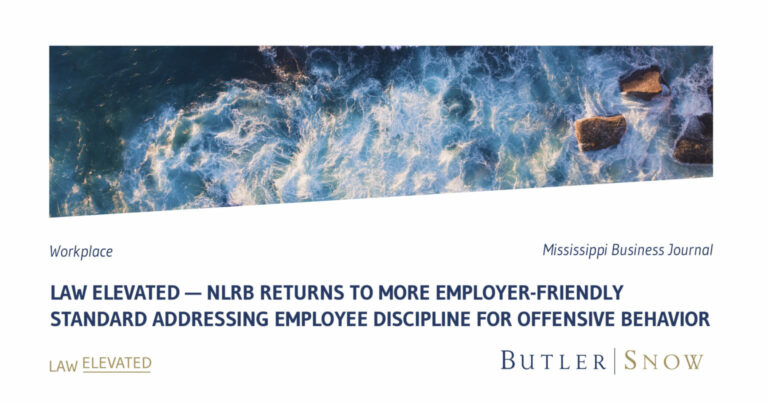This article was originally published in the Mississippi Business Journal.
In a recent decision, the National Labor Relations Board (NLRB) returned to a 40-year old standard that is more favorable to employers when considering the appropriateness of discipline issued to an employee for offensive behavior regardless of the circumstances in which the behavior occurred.
General Motors LLC, 369 NLRB 127 (2020). The NLRB’s decision makes it easier for employers to discipline employees guilty of offensive behavior – such as profane, racist and/or sexually unacceptable remarks – even though the employee may be engaged in protected concerted activity at the time.
For years, the NLRB utilized a test known as the Wright-Line standard in determining whether an employer violated an employee’s rights under Section 7 of the National Labor Relations Act (NLRA) following termination or other discipline of an employee for offensive behavior/comments while the employee was engaged in protected activity.
The Wright-Line standard was applied regardless of the circumstances or setting in which the employee’s conduct occurred. However, decisions from the NLRB during the Obama administration moved away from the straight-forward standard of Wright-Line and, instead, focused more on setting-specific standards and a variety of tests depending on the circumstances. Such varying tests would look at whether the offensive conduct occurred (1) during a confrontation with management, (2) during exchanges with co-workers and postings on social media, or (3) during an employee’s participation on a picket line. Under these varying standards, employees were provided much more protection for their actions/comments and often had their discipline or termination overturned as an unfair labor practice based on these varying standards. Obviously, these employee-forgiving standards were often in conflict with and adverse to the federal anti-discrimination laws which are intended to protect workers from offensive behavior/conduct in the workplace.
Fortunately, with the NLRB’s return to the Wright-Line standard, an employer’s disciplinary action against an employee for offensive behavior will not be considered an unfair labor practice, even if the employee is purportedly engaged in protected activity, without proof that the employee’s protected activity was “a motivating factor” in the employer’s discipline – regardless of the circumstances in which the behavior/conduct occurred. Even if this burden is met, the employer can still defeat the unfair labor practice charge under Wright-Line if it shows that it would have taken the same action or made the same decision in the absence of the employee’s protected activity.
With the General Motors decision, employers should feel comfortable revamping their workplace policies and conduct rules and make certain that those policies/rules are consistently and equally enforced in the workplace. Nevertheless, an employer should not take lightly the protections provided employees under Section 7 of the NLRA and the prohibition against retaliatory actions by employers. However, maintaining accurate records that reflect the employer’s consistent enforcement of workplace policies and conduct rules will greatly enhance its likelihood of success in defeating an unfair labor practice charge in the future.
» Timothy W. Lindsay has practiced exclusively in the area of labor and employment law since 1987 and has extensive experience in defending public and private employers against claims involving a wide variety of state and federal labor and employment laws.
